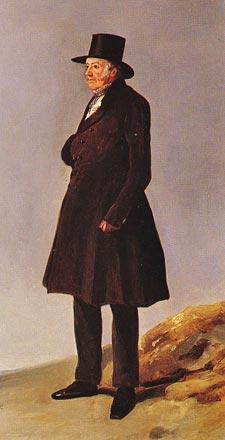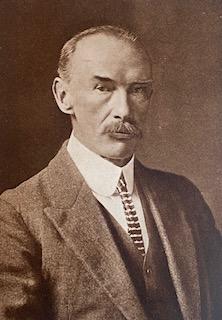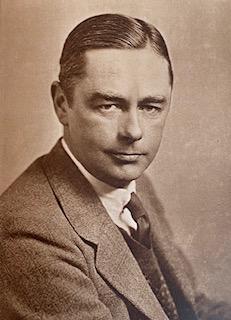Curator of the Sarawak Museum
Agent General, Western Australia
William Youatt was born in 1776, the son of a non-conformist minister. Youatt was appointed medical superintendent at the Gardens on a salary of £100 a year in 1833. He attended the gardens on a part time basis on a Monday and Thursday, and was expected to be ready to attend if any emergency arose, and to perform post mortems on the animals. Youatt had a practice in Wells Street, and founded the publication Veterinarian. He also lectured at London Veterinary College (now RVC). He continued in this post until his death is 1847.
Alfred Henry Garrod was born in London in 1846. He was the eldest child of Sir Alfred Barring Garrod, an eminent physician of the time. He studied medicine at Kings College London and was elected to St John's College, Cambridge in 1870. He started work as the prosector/anatomist at ZSL in 1871 and held this position until his death in 1879. He was especially interested in the anatomy of birds.
Anthony Salvin was an English architect, known mainly for house design in Tudor style and the restoration of a number of castles and churches. He was born in 1827 in Sunderland Bridge, County Durham to General Anthony Salvin Snr, and his second wife Elizabeth Mills. He was educated at Durham School, and for a time he worked under the Scottish architect John Patterson. He first moved to London in 1821 and is said to have worked in the office of John Nash. He was married in 1826 to his cousin Ann Andrews Nesfield with who he had 6 children, including the naturalist Osbert Salvin. He was awarded the royal gold medal from RIBA in 1863. He died in 1881 at his house Hawksfold in Fenhurst, Sussex.
Superintendent of the Gardens 1897-1903
Pocock was born in Clifton, Bristol, the fourth son of Rev. Nicholas Pocock and Edith Prichard. He began showing interest in natural history at St Edward's School, Oxford. He received tutoring in zoology from Sir Edward Poulton, and was allowed to explore comparative anatomy at the Oxford Museum. He studies biology and geology at University College, Bristol. In 1885 he became an assistant at the Natural History Museum, and worked in the section of entomology for a year. He was put in charge of the collections of arachnida and myriapoda. He was also given the task to arrange the British bird collections, in the course of which he developed as lasting interest in ornithology. The 200 papers he published in his 18 years at the museum brought him recognition as an authority on arachnida and myriapoda; he described between 300 and 400 species of millipedes alone, and also described the scorpion genus Brachistosternus.
In 1904, he left to become Superintendent of London Zoo, remaining so until his retirement in 1923. He then worked as a voluntary researcher in the British Museum, in the mammals department.
He described the leopon in a 1912 to 'The Field', based on examination of a skin sent to him by W S Millard, the secretary of the Bombay Natural History Society.
Born on 20th September 1890 at Hereford, he was the younger son of Henry Vevers, surgeon of Hereford, and he received his early education there before entering St Thomas' Medical School in 1909. On the outbreak of war in 1914, he went to Frances as a dresser with the British Red Cross Society but, after being sent back to qualify in 1915, he again served as Captain RAMC throughout the war in France until 1919, qualifying for the 1914-15 Star. He served as a casualty officer at St Thomas' and in 1919 became assistant helminthologist at the London School of Tropical medicine until 1923, having been awarded a Beit Memorial Fellowship during the years 1920-22.
He was honorary parasitologist to the Zoological Society of London from 1919 to 1921, and in 1921 was a member of the Filariasis Commission to British Guiana. In 1923 he was appointed Superintendent to the Zoological Society of London which he held until his retirement in 1948, receiving the Society's Silver Medal in 1942. In 1947 the Zoological Society of Glasgow and the West of Scotland awarded him its gold medal and he was also an honorary member of the Zoological Societies of Philadelphia and of Ireland. When the Society decided to start the collection at Whipsnade, he was chief assistant to the then Secretary, Sir Philip Chalmers Mitchell and he built a house for himself there as he had to do most of the fieldwork.
He paid several visits to Moscow where he succeeded in obtaining a number of rare animals and where he became a great admirer of the USSR, editing the Anglo-Soviet journal from 1939-1946.
As a student at St Thomas' he came a close friend of P H Mitchiner, who later became an honorary Fellow of the Zoological Society of London, and in 1946 Vevers was elected a Fellow of the College as a member of twenty or more years standing.
Vevers wrote numerous scientific papers and also books on natural history for children, on which subject he regularly broadcast in the BBC 'Children's Hour'.
He died on 9th January 1970 at his home Springfield, Whipsnade, and was survived by his wife and family



